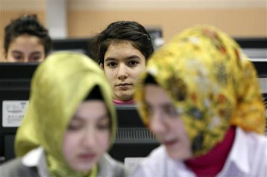Laçiner: societal mobilisation needed to save HDP
Ömer Laçiner in Birikim warns that the election campaign for the November 1 election will maybe be Turkey’s historically most violent one – including lynching, mass clashes, and provocations – with the highest number of casualties and incidents ever. The HDP is never going to enjoy the same kind of freedom of action that it enjoyed in the run-up to the June 7 election; that is because the party is going to be under extreme stress, subject to the AKP government’s schemes to criminalize it by mobilizing the “state.” This means that we need another constructive element, which by definition cannot be any of the political parties. A new “subject” has to enter the political equation. This “subject” should be borne out of a movement that conveys the messages of peace, brotherhood, and the feeling of justness to the society, by its own initiative. Such a movement would bring about a societal mobilization that ensures that the Turks among the citizens of the country by their votes make HDP the party that represents the whole of Turkey, this time also in the ethnic proportions of its votes.
Baydar: silencing media to win the election
Yavuz Baydar in Bugün asks, what kind of game is it that is being played openly now with the suffocation of media? The preservation of power depends on the emergence of a three-party parliament at the polls on November 1. An equation of four parties will spell disaster. Thus, it is absolutely necessary on the hand that the HDP is left out of the parliament, and on the other hand, that MHP is undermined and its votes transferred to AKP. In order to achieve these goals, a never before seen manipulation of public opinion is called for. The “silent majority” in Turkey – the lower and middle classes – (at a rate of around 80 percent) follow only the TV channels as sources of information. And note that the efforts of the government to cut the media down to size have always been concentrated on the media groups that have TV channels. Of course, the turn will come to independent newspapers like Cumhuriyet, Taraf, Sözcü and Birgün as well after this. If their attempts to suffocate the media results in a backlash, if the distribution of votes among the parties do not change, the option to postpone these elections is kept as a card in the cupboard.
The Islamization of Turkey: Erdoğan’s Education Reforms
By Svante E. Cornell (vol. 8, no. 16 of the Turkey Analyst)
The growing efforts at Islamization of Turkish society have largely gone unnoticed. For many years, Islamization was the dog that did not bark: in spite of dire predictions by secularists, the AKP did not introduce conspicuous efforts to Islamize Turkey. But since 2011, this has changed. The main exhibit is the education sector, which President Recep Tayyip Erdoğan has remodeled to instill considerably more Islamic content, in line with his stated purpose to raise “pious generations”. Ultimately, the Islamic overhaul of the education system is bound to have implications for Turkey’s civilizational identity, and on the choices it will make on where it belongs politically.

Turkey’s New Caretaker Government is a Pure AKP Government in Disguise
By M. K. Kaya (vol. 8, no. 16 of the Turkey Analyst)
In violation of the Turkish constitution, Ahmet Davutoğlu’s new caretaker cabinet is a pure AKP government. The government may be temporary, but it is nonetheless nothing but an expression of the determination of the AKP to secure permanent power. Both the process that led to its formation and its extra-constitutional composition bears testimony to the power-grab of the AKP.
Mahçupyan: PKK shot itself in the foot
Etyen Mahçupyan in Akşam writes that PKK has shot itself in the foot. At a point where it had the chance to force Turkey to a real peace, it seriously damaged its legitimacy by returning to war. Those who want to lend support to the Kurdish political movement now claim that Erdoğan has started the war because he could not become executive president or because he wants an election victory. These speculations are all baseless. The presidency is not part of the events, because a presidential system can only be introduced together with a new constitution, and even if were to come to power alone the AKP could not propose such a constitution by its own, because it would not be able to ensure the necessary legitimacy and permanency of the endeavor. Nor is there any logic behind the speculation about starting a war in order to win the election; because if such a perception has been established, you are not going to win an election anyway. Besides, if this is indeed the AKP’s purpose, then you’ll need to find an answer to why the PKK helped the AKP by executing those two police officers. So why did the cease-fire end? It ended because the PKK started to seek independence in Rojava, and because Turkey did not want to have a PKK state at its border. One should not forget that a PKK that establishes itself as a state means that there will be civil war in Turkey anyway. The AKP is not opposed to a Kurdish entity by its border; such an entity can even serve its purposes. But it is against every form of autonomy that is imposed by PKK. Thus, it did not hesitate to exploit the PKK’s serious mistake and reciprocated the invitation to end the cease-fire.


